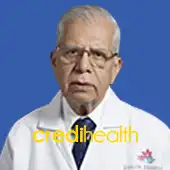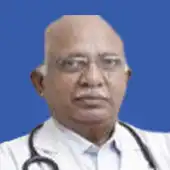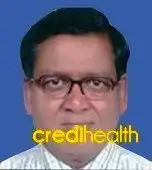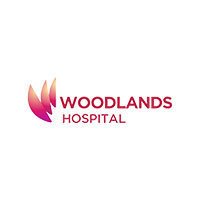Arrhythmias are abnormal heart rhythms that occur when the electrical signals that control the heart's contractions are disrupted. They can range from harmless to life-threatening conditions. It caused by various factors, such as heart disease, medications, or electrolyte imbalances. Some people with arrhythmias may not experience any symptoms, while others may experience palpitations, dizziness, fainting, or chest pain. Treatment options for arrhythmias include medications, medical procedures, and lifestyle changes, and the approach depends on the underlying cause and severity of the condition.
| Causes | Heart disease, electrolyte imbalance, medication |
|---|---|
| Remedies | Avoid caffeine, alcohol, tobacco |
| Preventive Options | Healthy lifestyle, medication adherence, stress management |
| Treatment Options | Metoprolol, Amiodarone, Cardioversion |
| Specialist | Cardiologist |
Arrhythmias are a group of conditions characterized by abnormal heart rhythms. The heart normally beats in a regular, coordinated pattern, but in people with arrhythmias, the heart may beat too fast, too slow, or irregularly. Arrhythmias can be caused by a variety of factors, including heart disease, genetics, and lifestyle factors. Some arrhythmias may not cause any symptoms, while others can lead to chest pain, fainting, and other serious complications. Treatment for arrhythmias may include medications, lifestyle changes, or medical procedures to restore normal heart rhythm.
Arrhythmias comes along with other symptoms. It also differs according to the other medical conditions. Some common symptoms of arrhythmias include in the following.
Arrhythmias are abnormal heart rhythms that can be caused by a variety of factors. There are several types of arrhythmias are written down below.
| Arrhythmias | Description |
| Atrial fibrillation | Occurs when the heart's upper chambers beat rapidly and irregularly |
| Atrial flutter | Similar to artrial fibrillation but rhythms are more organised |
| Supraventricular tachycardia | Occurs when the heart's electrical signals originate and cause a rapid heart rate. |
| Ventricular tachycardia | |
| Ventricular fibrillation | The heart's electrical signals become chaotic and disorganized |
| Long QT syndrome | Cause an increased risk of arrhythmias and sudden cardiac death |
| Brugada syndrome | Leading to an increased risk of ventricular arrhythmias and sudden cardiac death |
| Sick sinus syndrome | The heart's natural pacemaker does not function properly |
Arrhythmia can be a symptom or a first sign of various medical conditions, some of which include in the following.
Coronary artery disease occurs when the blood vessels that supply the heart with blood become narrowed or blocked by a buildup of plaque. This can cause arrhythmias such as atrial fibrillation, which increases the risk of stroke.
Heart failure occurs when the heart can't pump enough blood to meet the body's needs. Arrhythmias such as ventricular tachycardia or fibrillation are common in people with heart failure and can lead to sudden cardiac death.
Hypertrophic cardiomyopathy is a genetic condition where the heart muscle becomes abnormally thick, making it harder for the heart to pump blood. Arrhythmias such as ventricular tachycardia or fibrillation can occur, increasing the risk of sudden cardiac death.
Long QT syndrome is a genetic disorder that affects the electrical system of the heart, causing arrhythmias such as ventricular tachycardia or fibrillation. It can be triggered by exercise or stress and can cause sudden cardiac death.
Mitral valve prolapse is a condition where the valve between the heart's upper and lower chambers doesn't close properly, causing blood to leak back into the upper chamber. This can lead to arrhythmias such as atrial fibrillation.
Brugada syndrome is a rare genetic condition that affects the heart's electrical system, causing arrhythmias such as ventricular fibrillation. It can cause sudden cardiac death, particularly in people with a family history of the condition.
Arrhythmia is an abnormal heartbeat or heart rhythm that a variety of underlying conditions, such as heart disease, electrolyte imbalances, or medication side effects can cause. A healthcare provider may order one or more diagnostic tests to determine the underlying cause of the arrhythmia. Some common diagnostic tests for arrhythmia include in the following.
Treatment of arrhythmia includes several aspects as follows are given in the following.
Commonly used medications for the treatment of arrhythmia are
Amiodarone is an antiarrhythmic medication used to treat various types of arrhythmias, including atrial fibrillation, ventricular tachycardia, and ventricular fibrillation. It works by slowing down the heart rate and blocking certain electrical signals in the heart. It can be administered orally or intravenously.
Flecainide is another antiarrhythmic medication that is used to treat atrial fibrillation and other supraventricular arrhythmias. It works by slowing down the electrical signals in the heart and restoring normal heart rhythm. Flecainide is taken orally.
Sotalol is a beta-blocker that is used to treat various types of arrhythmias, including atrial fibrillation, ventricular tachycardia, and ventricular fibrillation. It works by slowing down the heart rate and blocking certain electrical signals in the heart. Sotalol is taken orally.
Verapamil is a calcium channel blocker that is used to treat supraventricular arrhythmias such as atrial fibrillation, atrial flutter, and paroxysmal supraventricular tachycardia. It works by blocking calcium channels in the heart, which slows down the heart rate and reduces the force of contractions. Verapamil is taken orally.
This is a minimally invasive procedure that uses radiofrequency energy or cryotherapy to destroy small areas of heart tissue that are causing the arrhythmia. The goal is to disrupt abnormal electrical signals and restore normal heart rhythm.
A pacemaker is a small device that is implanted under the skin of the chest to regulate the heartbeat. It sends electrical impulses to the heart to keep it beating at a steady rate.
An ICD is a device that is implanted under the skin of the chest and can detect and correct life-threatening arrhythmias such as ventricular fibrillation. It works by delivering an electrical shock to the heart to restore normal rhythm.
Making healthy lifestyle changes such as quitting smoking, reducing alcohol and caffeine intake, eating a healthy diet, and maintaining a healthy weight can help reduce the risk of developing arrhythmia.
Practicing relaxation techniques such as deep breathing, meditation, or yoga can help reduce stress and lower the risk of arrhythmia.
Some people find that acupuncture can be helpful in managing arrhythmia symptoms. Acupuncture involves the insertion of thin needles into specific points on the body to stimulate energy flow.
Here are the ways of Prevention of Arrhythmia
Maintaining a healthy lifestyle is an important part of preventing arrhythmia. Here are some tips
A diet that is high in fruits, vegetables, whole grains, lean proteins, and healthy fats can help reduce the risk of arrhythmia.
Regular exercise can help improve heart health and reduce the risk of arrhythmia. Aim for at least 30 minutes of moderate-intensity exercise most days of the week.
Tobacco use can increase the risk of arrhythmia, so avoiding tobacco products is important for prevention.
Excessive alcohol consumption can increase the risk of arrhythmia, so it's important to limit intake.
Stress can trigger arrhythmia in some people, so managing stress is an important part of prevention. Here are some techniques
Techniques such as deep breathing, meditation, or yoga can help reduce stress and lower the risk of arrhythmia.
Getting enough restful sleep is important for managing stress and reducing the risk of arrhythmia.
Identify and avoid situations or activities that may cause stress, such as certain social situations or work-related stress.
Certain medications can increase the risk of arrhythmia, so it's important to be aware of potential side effects and to discuss any concerns with your doctor. Here are some tips
Follow the prescribed dosage and instructions for any medications that you are taking.
Some medications can cause arrhythmia as a side effect, so it's important to be aware of potential risks and to report any symptoms to your doctor.
If you have concerns about your medications or their potential side effects, talk to your doctor.
Regular checkups with a healthcare provider can help detect and manage arrhythmia early on, reducing the risk of complications. Here are some tips
Checkups Schedule regular checkups with your doctor to monitor heart health and detect any potential issues early on.
History If you have a family history of arrhythmia or other heart conditions, be sure to discuss this with your doctor.
Follow your doctor's recommendations for screenings, tests, and other preventive measures.
Arrhythmia is a condition where there is an irregular heartbeat or heart rhythm. Here are some instances when you should see a doctor if you have arrhythmia are given in the following.
If you have arrhythmia and are concerned about your health, it is important to seek immediate medical attention from a qualified arrhythmia doctor. A doctor specializing in treating arrhythmia, such as a Cardiologist, would be the right health professional to consult.
Here is a list of Top verified doctors for arrhythmia. You can book an appointment with one to start your arrhythmia treatment today.

Jaslok Hospital, Mumbai
Rs. 2,500 Consult Fees

CARE Hospital, Banjara Hills, Hyderabad
Rs. 1,000 Consult Fees

Indraprastha Apollo Hospital, Sarita Vihar, Delhi NCR
Rs. 1,800 Consult Fees
A hospital can provide various services to help diagnose and treat your arrhythmia. If you are experiencing arrhythmia In that case, it is important to visit a arrhythmia hospital for a proper diagnosis and treatment plan.
Check a list of Top Hospitals for arrhythmia treatment.
Multi Speciality Hospital
Established in 1918
🛌345 Beds
.png)
Multi Speciality Hospital
Established in 1940
🛌220 Beds

Multi Speciality Hospital
Established in 1947
🛌230 Beds
Frequently asked questions and answers about arrhythmia.
How serious is a heart arrhythmia?
The seriousness of a heart arrhythmia depends on the type and severity of the condition, with some arrhythmias being benign and others potentially life-threatening.
What are the 4 types of arrhythmias?
The four main types of arrhythmias are premature contractions, supraventricular arrhythmias, ventricular arrhythmias, and bradyarrhythmias.
What are the warning signs of arrhythmia?
Warning signs of arrhythmia can include palpitations, dizziness, lightheadedness, chest pain or discomfort, shortness of breath, and fatigue. If you experience any of these symptoms, it's important to speak with a healthcare professional.
Reviews by patients on different.
Anandita
My father went for a health check up alone at Kokilaben hospital. He was doing stess test and he developed Anterior wall Myocardial infarction (Major heart attack). Thanks to immediate attention by Dr. Pravin Kahale and his team who took my father immediately for Emergency angioplasty even though we were at home. In a heart attack, every minute delay leads to damage to heart muscle and has long term consequences of a weak heart. My father had good salvage and early prompt action lead to preserve heart pumping. Dr. Kahale is an excellent doctor. He has very deep knowledge. He writes few but best medications. He also makes us understand complex things in simple language. Our entire family would strongly recommend Dr. Kahale as a cardiolgist who can deliver the best in most complex cardiac issues. He is always accessible to the entire family and is only a phone call/ message away and resolves all the queries. Highly recommended!
Ishwar Devi
Artemis Hospital
<p>My mother had a bad chest pain the other day. We decided to get her regular checkup done and approached Credihealth for the same. After a couple of options, we decided to visit Artemis. The overall process was very smooth. The ECG had some abnormality. So we consulted Dr Kuldeep Arora for it. He is one gem of a doctor. He was very friendly to talk to. Very sensitive to my mothers concerns. He explained all the medical reports including ECG. We gained immediate confidence in the doctor. He advised a few additional tests. Those were done on same day. After seeing those reports, he proposed a treatment plan. Considering my mothers age, it was empathetic for him to tell no to any procedure. He recommended meds for 2 months and told us to come back in between. Friendly, sensitive and empathetic. All in all good experience.</p>
Dr. Bhabendra Nath Kalita
Dr. Venkatesh treated my dad with utmost care. Although my dad & his reports were not in station, he eagerly looked into the Angiogram video (done in a different place) of my father in my mobile and suggesting corrective treatments. He patiently advised me many things and repeated them again & again for my better understanding. The operation was done by Dr. Girish and although it was critical, it was successful. Dr. Venkatesh has visited us many times during our stay at the hospital despite his busy schedule to inquire about the wellbeing of my father. During the follow-up visits, Dr. Venkatesh has examined my Dad with utmost details, gave proper advice, and suggested & changed medicine courses to suit my dad's body as he has high blood pressure & diabetics. I wish him great success in his career and love of his patients.
Credihealth is an online healthcare portal for all your hospital appointments, diagnostic test bookings, ordering medications, or homecare services. If you have any inquiries, our in-house medical experts can help solve them and guide you to the best specialist in the India.